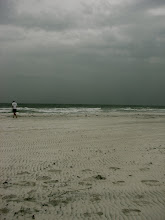The first time I went was with Chicago Mike and Chuck (who was also from Chicago). Mike was back in Chicago by then (from L.A.) and they drove down and picked me up in Champaign. I had my daughter by then and it was a nice break from child-rearing to be able to go camping for a weekend. We headed for the Garden of the Gods (not the one in Colorado Springs, CO) part of the park, where big sandstone formations and cliffs were scattered among the trees and hills. It's a surprising area for the midwest and not a lot of people outside of the area know about it. Yes, we had a nice time. But there was a lot more to the forest, so I wanted to return sometime.
And I did.
The next time I went to the Shawnee, I went alone. This started my habit of camping alone--and preferring it alone--which I still do to this day (when I can). This time I went to the Giant City area of the park. Giant City is an area where huge stones are cast about in the forest, with pathways and cliffs and trickling waters (it looks like a giant city, see?) and I had a great time hiking about. My campground wasn't among the boulders, but I was there in the early spring and there were dogwoods abloom and russian olive trees abloom and their scent and beauty permeated my camping spot. I was also alone in the spot--had the whole tent-camping area to myself to wander and sniff and see. I came back to that spot the next year, but later, and missed both the dogwood and olive blooms and also had much company--college kids getting done with finals at Southern Illinois in Carbondale--who partied into the night.
That second experience around Giant City led me to find more primitive and less-traveled accommodations the next time I went (and the last, before we moved to Florida).
I knew the forest better and chose to visit the Lusk Creek Wilderness my last time in the Shawnee. I'd drive from Champaign to Highland, Il (near St. Louis), taking Fru and our two baby girls to visit Fru's grandmother--Mormor--and then I'd hop on down to the southern part of the state to do some lonely camping. (We went to Highland often, to visit Mormor or Fru's aunt and uncle and their daughters; sometimes I'd stay there, sometimes I'd go to Belleville, Il to visit Mike and Denise [who I knew from my FL panhandle days] or sometime I'd come back to Champaign to work on my novel or, go camping.) This time in the Shawnee I camped at a small campground tucked in among the hollows where a rocky stream ran and there was a big pond with lily pads. It was not in an area of sandstone formations or big boulder rocks, so there was no one else there but me--it was rainy and cool also, which helped. And from there I hiked into the Lusk, which was a true wilderness site among the protected woods of the Shawnee (semi-protected: there was a lot of logging still going on in those Federal woods).
In the Lusk there were pines and hardwoods, there were white birch trees and cliffs and a river that ran slowly through it all. There was a place called the Indian Kitchen which was high on a bluff trail, a half-cave whose walls were blackened from long-ago Indian fires. It was all very peaceful, all very nice. I had a great lonely time, better than the other places. And like I said, this set off my solo camping career (though I did do dome solo camping back in Montana, at least once along Lake Como [yes, named for Italy's Lake Como] in the Bitterroots). (Maybe this trip was in 95, not 94'.)
I'd like to get back to the Lusk. To the Shawnee. Every midwestern state (every state, really) has some hidden landscape gems among them. Most people don't think of a forest with hills and swamps and cliffs and boulders when they think of Illinois. They think of Chicago. Maybe of corn and soybean fields. I'm not crazy about Illinois, but then again, I know and like Illinois. I know and like the Shawnee National Forest.
